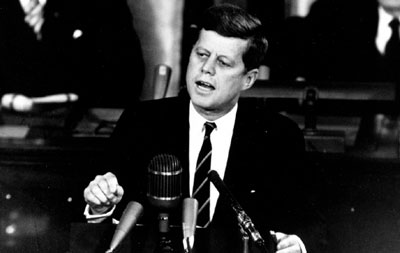 Kennedy used space to rally the country, and his presidency, after some initial setbacks. (credit: NASA) |
A rough honeymoon does not doom a marriage
by Stokes McMillan
Monday, January 26, 2009
“We want you to succeed.” The words expressed by President Bush to President-elect Obama during the recent gathering of all the living presidents convey the feelings of all American citizens. But does success of the four-year administration depend upon its performance during the first 100 days in office?
Considering the alarming starting conditions that Obama will inherit—some pundits claim that the nation and the world are in worse shape since those handed over to FDR in 1933—there is a fair chance that the Obama administration may struggle during its “honeymoon” period. Its performance may be less than stellar. History has shown, however, that bold action during the rough honeymoon period can result in an enduring legacy. One president to whom Obama has been closely compared had a very rough 100-day honeymoon, but he went on to be well regarded. One of the events that brought him much grief eventually resulted in one of America’s greatest triumphs.
Young President John F. Kennedy experienced two huge public relation disasters soon after his January 20, 1961 inauguration. On April 12, 1961, the Soviet Union launched Yuri Gagarin on the world’s first manned space flight, a jolt to America’s pride. The second blow came only a week later with the Bay of Pigs fiasco, where a Kennedy-approved invasion force of American immigrants exiled from Cuba attempted to overthrow the government of Fidel Castro but failed miserably.
Both events occurred during the initial 100-day period when a president is supposed to reshuffle the deck and charge ahead. Instead of showing he was in control, however, Kennedy appeared to be struggling. The pressure was on him to do something quickly to save face. He turned to space.
Contrary to popular opinion, President Kennedy was not enamored with spaceflight when he first took office. NASA was not then a prestigious or popular agency. To illustrate, when the incoming Kennedy administration sought to replace NASA’s first administrator, at least seventeen people declined the offer before James Webb reluctantly accepted.
| Audacious action during trying times can turn adversity into triumph and lead to a magnificent outcome. Kennedy chose the space program as his path out initial troubles and to demonstrate America’s world leadership. |
Only after the double dose of crushing April events did Kennedy seriously think about space. And he thought about it only because Congress and the press hounded him for lagging behind the Soviets. He needed something in which he could beat the Soviets, and beat them in grand fashion. Boldly, in a speech to Congress near the end of May, he proposed to land a man on the moon by the end of the decade and bring him safely back home. It was a huge, chips all-in gamble. The sum total of America’s manned spaceflight experience at the time consisted solely of Alan Shepard’s fifteen-minute suborbital flight twenty days earlier.
History looks upon the result of Kennedy’s enormous decision as one of mankind’s greatest accomplishments and perhaps this president’s greatest legacy. Few remember that Kennedy’s first 100 days were marred by unfortunate events, but all remember the footsteps on the moon brought about by his bold action to recover.
With the world in its present condition, President Obama will face huge challenges during his honeymoon period. But as President Kennedy’s example showed, audacious action during trying times can turn adversity into triumph and lead to a magnificent outcome. Kennedy chose the space program as his path out initial troubles and to demonstrate America’s world leadership. President Obama will now have the opportunity to make his own bold decisions that yield an enduring legacy. Let’s hope that he chooses to follow President Kennedy’s lead in creating a legacy of space.
Stokes McMillan (stokesmcmillan@gmail.com) is a NASA engineer in the Space Shuttle program at the Johnson Space Center.
|
